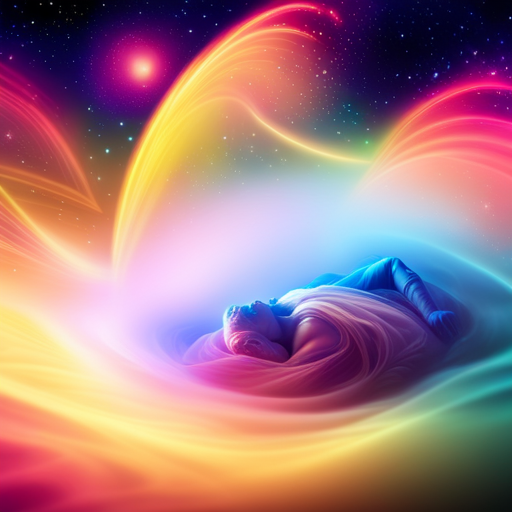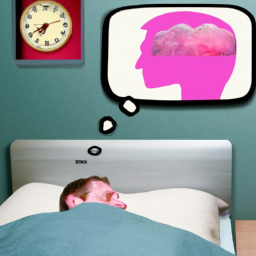I have definitely experienced waking up from a dream that felt incredibly real, almost like I was actually living it. These vivid dreams can be quite an intense and memorable experience.
But what do these vivid dreams really mean?
In this article, we will delve into the fascinating world of vivid dreams and explore their possible causes, impact on sleep quality, and psychological and emotional effects. We will also touch on the spiritual and metaphysical perspectives surrounding these dreams.
Additionally, I will provide you with some helpful tips on managing and coping with vivid dreams, as well as guide you on when it may be necessary to seek professional help.
So, if you’ve ever wondered what it means when someone has vivid dreams, this article is for you. Let’s dive in and unravel the mysteries behind these captivating nocturnal adventures.
Key Takeaways
- Vivid dreams can provide valuable insights into our subconscious mind, emotions, desires, and fears.
- Lucid dreaming techniques can help individuals be aware that they are dreaming and actively participate in the dream narrative.
- Stress, anxiety, sleep disorders, certain medications, and substances can contribute to the intensity and vividness of dreams.
- Coping strategies, mindfulness techniques, therapy, and professional help can assist in managing and finding relief from intense dream experiences.
Definition of Vivid Dreams
Do you ever wake up feeling like you’ve just experienced a wild adventure? That’s what it means to have vivid dreams!
Vivid dreams are defined as dreams that feel incredibly real and lifelike, with vivid imagery, sensations, and emotions. These dreams can leave a lasting impression and can be interpreted in various ways.
One of the interesting aspects of vivid dreams is their potential for interpretation. Many people believe that dreams hold valuable insights into our subconscious mind and can provide clues about our emotions, desires, and fears. Some individuals even use interpretation techniques, such as dream journals or working with a therapist, to gain a deeper understanding of the messages hidden within their dreams.
In addition to their interpretive potential, vivid dreams can also have spiritual effects. Some individuals believe that vivid dreams are a way for the soul to communicate with us or for us to connect with higher realms of consciousness. These dreams can provide a sense of awe, wonder, and spiritual awakening.
Now let’s explore the common characteristics of vivid dreams and delve deeper into their fascinating nature.
Common Characteristics of Vivid Dreams
One striking aspect of vivid dreams is their ability to transport us into a world filled with vibrant colors, surreal landscapes, and vivid emotions. Can you imagine a dream that feels more real than reality itself?
Vivid dreams often contain deep symbolic meanings that can provide valuable insights into our subconscious mind. These symbols can represent our fears, desires, and unresolved issues, offering us a chance to explore and understand our innermost thoughts and feelings.
Moreover, some individuals have reported experiencing lucid dreams, where they’re aware that they’re dreaming and can actively participate in the dream narrative. Lucid dreaming techniques, such as reality testing and dream journaling, can help cultivate this ability and enhance the vividness of dreams. By becoming conscious in our dreams, we can gain even more control over the symbolic elements and explore their significance in a more intentional manner.
This deeper understanding of our dreams can provide valuable guidance and facilitate personal growth. Moving forward, it’s important to explore the possible causes of vivid dreams without dismissing them as mere figments of our imagination.
Possible Causes of Vivid Dreams
When it comes to understanding the possible causes of vivid dreams, three key factors come to mind: stress and anxiety, sleep disorders, and medications and substances.
Stress and anxiety can lead to heightened brain activity during sleep, resulting in more vivid and intense dreams.
Sleep disorders such as insomnia or sleep apnea can disrupt the normal sleep cycle and increase the likelihood of experiencing vivid dreams.
Additionally, certain medications and substances, such as antidepressants or alcohol, can also contribute to the vividness of dreams.
Stress and Anxiety
If you’re feeling stressed or anxious, your vivid dreams can transport you to a world filled with intense emotions and vivid scenarios. Stress and anxiety are known to have a significant impact on dream recall and intensity. Research suggests that when we are under stress, our brain is more active during sleep, leading to more vivid and detailed dreams. These dreams often reflect our subconscious worries and anxieties, creating scenarios that may seem incredibly real. Coping strategies and mindfulness techniques can help reduce stress and anxiety, potentially leading to a decrease in vivid dreams. By practicing relaxation techniques, such as deep breathing or meditation, you can calm your mind before sleep and promote more peaceful dreams. Understanding the connection between stress, anxiety, and vivid dreams can provide valuable insights into managing your sleep experiences. Transitioning into the subsequent section about sleep disorders, it is important to note that vivid dreams can also be a symptom of certain sleep disorders.
Sleep Disorders
To fully understand the impact of sleep disorders, you need to step into the shoes of someone who’s constantly tossing and turning, chasing sleep like a dog chasing its tail. Sleep disorders, such as sleep paralysis, nightmares, and night terrors, can have a profound effect on a person’s well-being and daily functioning.
Sleep paralysis, a condition where a person is temporarily unable to move or speak while falling asleep or waking up, can be terrifying and disorienting. Nightmares and night terrors, on the other hand, can cause intense fear and distress during sleep, often accompanied by vivid and disturbing dream imagery. These sleep disturbances can lead to significant daytime sleepiness, impaired concentration, and emotional disturbances.
Understanding the experiences of individuals with sleep disorders is crucial in developing effective treatments and interventions. Moving forward to the next section about medications and substances, it’s important to explore how they can impact sleep quality and dream experiences.
Medications and Substances
As we discussed earlier, sleep disorders can have a significant impact on the occurrence of vivid dreams. However, it’s important to note that medications and substances can also play a role in the vividness of our dreams.
Certain medications, such as antidepressants, antipsychotics, and blood pressure medications, have been known to cause vivid dreams as a side effect. Additionally, recreational drug use, particularly substances like marijuana and hallucinogens, can also lead to more vivid and intense dreams.
It’s worth mentioning that the interaction between medications and substances can further amplify the intensity of these dreams. Combining certain medications with recreational drugs can result in even more vivid and bizarre dream experiences.
Understanding the impact of medication interactions and recreational drug use on dream vividness can help individuals make informed decisions about their sleep quality.
Now, let’s explore the impact of vivid dreams on sleep quality.
Impact of Vivid Dreams on Sleep Quality
Having vivid dreams can significantly affect the quality of sleep one experiences. Not only can they disrupt the sleep cycle, but they can also impact mental health and the relationship with dream recall. The intensity and vividness of dreams can lead to increased cognitive activity during sleep, resulting in fragmented and less restorative rest. This can contribute to feelings of daytime sleepiness, fatigue, and decreased overall well-being.
| Pros | Cons |
|---|---|
| Provides entertainment | Disturbs sleep |
| Enhances creativity | Causes fatigue |
| Offers insight into emotions | Disrupts sleep cycle |
| Can be a source of inspiration | Increases daytime sleepiness |
| Allows for problem-solving | Decreases overall well-being |
Research suggests that individuals who experience vivid dreams may have a higher risk of developing mental health conditions such as anxiety and depression. Additionally, the relationship between dream recall and the impact of vivid dreams on mental health is important to consider. Those who can remember their dreams in detail may be more influenced by the emotional content of their dreams, which can further affect their mental state.
Transitioning into the next section about the interpretation of vivid dreams, it is fascinating to explore the meaning behind these vivid experiences and how they can provide valuable insights into our subconscious minds.
Interpretation of Vivid Dreams
One interesting statistic is that approximately 95% of dreams are forgotten within the first 5 minutes of waking up, highlighting the importance of interpretation in understanding the hidden messages within vivid dreams. When someone has vivid dreams, it can be a sign that their subconscious mind is trying to communicate something significant. Interpretation techniques can help unlock the meanings behind these dreams, providing valuable insights into one’s emotions, fears, and desires.
There are several methods for interpreting vivid dreams. One approach is to keep a dream journal, where individuals write down their dreams immediately upon waking. This can help identify patterns and symbols that may recur throughout different dreams, offering clues to their meaning.
Another technique is to engage in active imagination, where individuals mentally revisit the dream and imagine different outcomes or conversations with dream characters. This can provide a deeper understanding of the dream’s symbolism and messages.
Additionally, lucid dreaming techniques can be used to gain more control and clarity in vivid dreams. Lucid dreaming involves becoming aware that one is dreaming while still in the dream state. This awareness allows individuals to actively participate in and shape the dream, making it easier to interpret and derive meaning from the experience.
Interpreting vivid dreams can provide valuable insights into the subconscious mind. By using interpretation techniques and practicing lucid dreaming, individuals can gain a deeper understanding of themselves and their dreams. This understanding can lead to personal growth and self-awareness. Moving forward, let’s explore techniques for enhancing vivid dreams and harnessing their potential for personal development.
Techniques for Enhancing Vivid Dreams
Dream journaling and reality checks are two effective techniques for enhancing vivid dreams. By keeping a dream journal, I can record the details of my dreams immediately upon waking, allowing me to better remember and analyze them.
Reality checks involve regularly questioning whether I’m dreaming or awake, which can help me become more aware in my dreams and potentially experience more vivid and lucid dreaming.
These techniques have been researched and proven to be effective in enhancing the intensity and clarity of dreams.
Dream Journaling
To truly harness the power of dream journaling, it’s important to document your vivid dreams as soon as you wake up. By writing down your dreams, you can gain insight into your subconscious mind and explore the depths of dream interpretation. Dream journaling can also be a useful tool for those interested in lucid dreaming techniques. It allows you to identify recurring themes or patterns in your dreams, which can help you recognize when you are dreaming and potentially achieve lucidity.
To give you an idea of what a dream journal might look like, here is a 2-column, 4-row table:
| Date | Dream Description |
|---|---|
| 5/1 | Flying over a beautiful landscape |
| 5/3 | Being chased by a mysterious figure |
| 5/5 | Swimming with dolphins in the ocean |
| 5/7 | Exploring a haunted house |
By keeping a record of your dreams, you can better understand your subconscious mind and potentially unlock the power of lucid dreaming. Now, let’s move on to the next section about reality checks.
Reality Checks
Are you curious about reality checks and how they can enhance your dream experiences? Reality checks are techniques that help you determine whether you’re dreaming or awake. By regularly performing reality checks throughout the day, you can train your brain to do the same in your dreams, leading to lucid dreaming.
Lucid dreaming is a state where you become aware that you’re dreaming while still in the dream. Reality checks can include actions like pinching yourself, looking at a clock, or trying to push your finger through your palm. These checks are based on the idea that our dream reality often includes inconsistencies that can help us recognize that we’re dreaming.
By incorporating reality checks into your daily routine, you can increase your chances of experiencing lucid dreams.
Transitioning into the next section, let’s explore the psychological and emotional effects of vivid dreams.
Psychological and Emotional Effects of Vivid Dreams
Experiencing vivid dreams can deeply impact a person’s psyche and stir up powerful emotions. These dreams can be intense and lifelike, leaving a lasting impression on our minds.
From a psychological perspective, vivid dreams can have a range of effects on our mental and emotional well-being. One of the psychological effects of vivid dreams is the opportunity for self-reflection and introspection. The vivid imagery and emotions experienced in these dreams can provide valuable insights into our subconscious thoughts and feelings. By analyzing and interpreting these dreams, we can gain a better understanding of ourselves and our innermost desires.
Additionally, vivid dreams can bring about heightened emotions. The intense feelings experienced during these dreams can linger even after waking up, affecting our mood and overall emotional state. For instance, a vivid dream filled with fear and anxiety can leave us feeling unsettled and on edge throughout the day.
Furthermore, some individuals may use lucid dreaming techniques to gain control over their vivid dreams. Lucid dreaming involves being aware that you are dreaming while in the dream itself. This awareness allows individuals to actively participate in and manipulate the dream, potentially influencing the emotional impact it has on them.
Vivid dreams can have profound psychological and emotional effects. They offer an opportunity for self-reflection and can evoke intense emotions. Understanding and interpreting these dreams can provide valuable insights into our subconscious minds.
Moving forward, let’s explore the spiritual and metaphysical perspectives on vivid dreams.
Spiritual and Metaphysical Perspectives on Vivid Dreams
Immerse yourself in the mystical realm of vivid dreams and explore their profound spiritual and metaphysical significance.
Vivid dreams have long been seen as more than just random scenes playing out in our minds while we sleep. Many cultures and belief systems have attached deep spiritual meaning to these experiences, offering various interpretations and insights into their nature.
One spiritual interpretation of vivid dreams suggests that they are a gateway to the astral realm, a dimension beyond our physical reality. According to this perspective, vivid dreams allow our souls to travel and explore this astral plane, connecting with higher realms of consciousness and gaining valuable insights and guidance. Some even believe that astral projection, the ability to consciously leave one’s body during sleep, is closely tied to vivid dreaming.
Metaphysically, vivid dreams are seen as a way for the subconscious mind to communicate with the conscious mind. Symbols and imagery in these dreams are believed to hold hidden messages and deeper meanings, providing us with valuable insights into our emotions, desires, and spiritual growth.
As we delve into the realm of vivid dreams from a spiritual and metaphysical perspective, we gain a deeper understanding of their significance and potential impact on our lives. With this knowledge, we can better navigate and make sense of these profound experiences.
Transitioning into the next section about managing and coping with vivid dreams, it is important to recognize that while these dreams hold great spiritual and metaphysical significance, they can also be overwhelming and disruptive at times. Therefore, it’s essential to learn effective techniques to manage and cope with the intensity of vivid dreams.
Tips for Managing and Coping with Vivid Dreams
Transition: Now that we have explored the spiritual and metaphysical perspectives on vivid dreams, let’s delve into some practical tips for managing and coping with them. As someone who frequently experiences vivid dreams, I have found various techniques that can help navigate this intense dream world.
Coping strategies for vivid dreams involve creating a calming bedtime routine, such as practicing relaxation techniques like deep breathing or meditation before sleep. It can also be helpful to keep a dream journal by your bedside to record and reflect on your dreams, allowing you to process any emotions or themes that arise. Another technique is to engage in lucid dreaming, where you become aware that you are dreaming and can actively participate in shaping the dream. This can be achieved through reality checks throughout the day and maintaining a strong intention to become lucid in your dreams.
To provide a visual representation of these coping strategies, here is a table outlining some effective techniques:
| Coping Strategies | Lucid Dreaming Techniques |
|---|---|
| Relaxation techniques | Reality checks |
| Dream journaling | Strong intention |
| Mindfulness practice |
By implementing these coping strategies and lucid dreaming techniques, individuals can gain a sense of control and empowerment over their vivid dreams. However, if these techniques do not alleviate distress or if the vivid dreams become increasingly disruptive to daily life, it may be necessary to seek professional help.
Transition: Next, we will explore when it is appropriate to seek professional assistance for vivid dreams.
When to Seek Professional Help for Vivid Dreams
By reaching out to a professional, individuals can access the guidance and support needed to effectively manage and cope with their intense dream experiences. Seeking therapy can be a beneficial option for those who find themselves struggling with vivid dreams. A trained therapist can help individuals explore the underlying causes of these dreams and develop strategies to reduce their intensity or frequency.
Therapy sessions may involve techniques such as dream analysis, where the therapist helps the individual understand the symbolism and meaning behind their dreams. This can provide valuable insights into their subconscious thoughts and emotions. Additionally, therapists can teach relaxation and stress-reduction techniques that can help individuals achieve a more peaceful sleep and reduce the likelihood of intense dreams.
In some cases, self-help techniques may also be effective in managing vivid dreams. These techniques can include maintaining a consistent sleep schedule, engaging in regular exercise, practicing relaxation exercises before bed, and creating a calming bedtime routine. Journaling can also be helpful, as it allows individuals to process and release any emotions or anxieties that may be manifesting in their dreams.
However, if vivid dreams persist and significantly disrupt daily life, it’s important to seek professional help. A therapist can provide the necessary guidance to navigate through these intense dream experiences and develop effective coping mechanisms. Remember, reaching out for support is a proactive step towards managing and finding relief from vivid dreams.
Frequently Asked Questions
Can vivid dreams be a sign of a mental health condition?
Vivid dreams can potentially indicate a psychological impact and be a sign of an underlying mental health condition. Dream interpretation plays a crucial role in understanding the significance of these dreams.
Research suggests that vivid dreams may be linked to conditions such as anxiety disorders, depression, and post-traumatic stress disorder. By analyzing the content and emotions experienced in these dreams, professionals can gain insights into a person’s mental well-being and provide appropriate support and treatment.
Are there any medications that can cause vivid dreams?
Yes, there are medications that can cause vivid dreams as a side effect. Certain classes of medications, such as antidepressants, antipsychotics, and sleep aids, have been known to increase dream intensity and recall. This is believed to be due to their effects on neurotransmitters in the brain.
It’s important to note that not everyone who takes these medications will experience vivid dreams, and the occurrence and intensity of such dreams can vary from person to person.
Can vivid dreams be a result of sleep disorders?
Vivid dreams can indeed be a result of sleep disorders. There’s a strong relationship between the quality of sleep and the intensity of dreams. Sleep disorders such as sleep apnea, insomnia, and restless leg syndrome can disrupt the sleep cycle, leading to more frequent and intense dreams.
To manage and reduce the intensity of vivid dreams, techniques such as improving sleep hygiene, practicing relaxation exercises, and avoiding certain foods and medications before bed can be helpful.
Do vivid dreams have any long-term effects on mental health?
Vivid dreams can have long-term effects on mental health. Research shows that individuals who frequently experience vivid dreams are more likely to develop mental health conditions such as anxiety and depression.
A study conducted by the University of Helsinki found that 80% of participants who reported vivid dreams also had symptoms of mental health disorders. These findings suggest that vivid dreams may serve as early indicators of underlying mental health issues and should be taken seriously.
Are there any specific foods or drinks that can trigger vivid dreams?
Certain foods and drinks can potentially trigger vivid dreams. For example, consuming caffeine or eating spicy foods before bed may lead to more intense and vivid dreams.
Additionally, alcohol has been known to affect REM sleep, the stage of sleep where dreams occur, which could result in more vivid dreaming.
Stress can also impact dream vividness, as heightened stress levels can lead to more intense and vivid dreams.
Lucid dreaming, where one is aware that they’re dreaming, can enhance dream vividness as well.
Conclusion
In conclusion, vivid dreams aren’t just ordinary dreams – they’re extraordinary journeys that can transport us to unimaginable realms of our subconscious mind. These intense and lifelike dreams have the power to captivate us, leaving a lasting impact on our sleep quality, emotions, and even our spiritual beliefs. While some may find them exhilarating, others may struggle to cope with the intensity. Thankfully, with proper management techniques and professional help if needed, we can navigate the captivating world of vivid dreams and unlock their hidden meanings.
So buckle up and get ready for a wild ride through the fascinating realm of your dreams!









